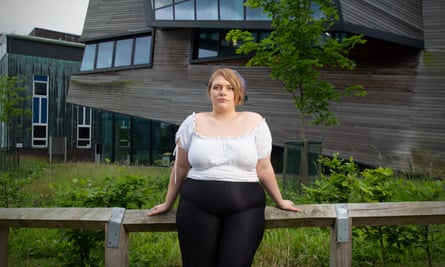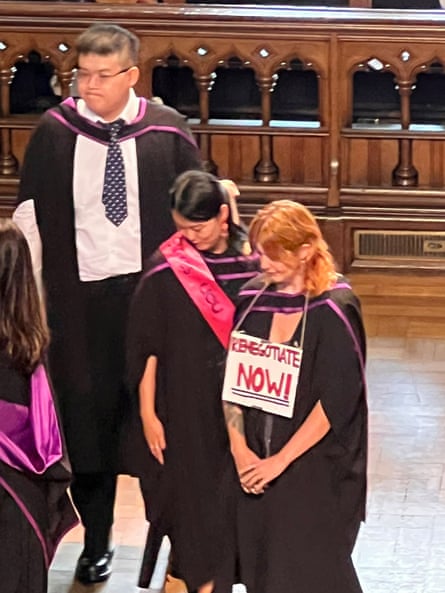Emily Smith, a final year geography student at Durham University, never imagined her already heavily disrupted university experience could end like this. She won’t be graduating this summer because half her work remains unmarked owing to a national marking boycott by lecturers.
She refuses to attend the “completion ceremony” Durham has offered her instead. Without an actual degree, which she has been told she won’t receive until next spring, it seems like a “farce”. Like so many in this deeply unlucky cohort of students, she feels this is the last straw.
“I’m so fed up with everything now,” she told the Observer. “Every single stage of my education since A-levels has been overshadowed by factors out of my control.”
Smith was in her last year of A-levels in 2020 when the pandemic broke out, and her exams (like her school prom) were cancelled. Her initial A-level results, marked using Ofqual’s controversial algorithm, were lower than the predicted grades she applied to university with. The government’s last minute U-turn to accept teacher-assessed grades meant that her maths grade went up, but she still felt cheated.“Other schools were more generous. My teachers were harsh with their grades because they didn’t want to be caught out,” she says. It felt deeply unfair. But she told herself: “When I get to university it will all get better.”
She was wrong. Smith arrived at Durham for a freshers’ week in which most events were online to reduce the spread of infection. She was initially only allowed to leave her room for college meals. Then on the final day she was put into isolation in her student flat. “I had irresponsible housemates who went out and brought Covid back,” she says.

She spent a term of her first year back at home due to Covid restrictions, and the other two terms “basically on my own studying in my room. I didn’t set foot in a lecture theatre until my second year,” she says. Even then her first experience ended with her being evacuated because the air-quality sensors said it wasn’t safe.
In her final year, her father was in hospital with sepsis, and with her dissertation deadline looming she had to go home to help her mother. She requested a week’s extension but was refused. Now, with her longest ever piece of work languishing unmarked on a pile, she is furious.
“I didn’t sleep for three days because I was up writing that dissertation,” she says. “No one has even looked at it.”
Smith and her friends don’t know what their future holds. Some are worried about whether they can get a job – or take up an existing offer – with no degree yet. One of her friends has just lost her place on a masters degree course in Switzerland.
Smith wants to be a teacher and had a place to do postgraduate training at a university, but it was conditional on her obtaining a 2.1 degree. She has contacted the admissions officer but has yet to receive a concrete answer.
Durham told the Observer that it would negotiate directly with employers or universities offering masters courses to help students. A spokesperson said: “We deeply sympathise with our students, already impacted by the pandemic, who now endure further uncertainty and anxiety.” He added that it was “deeply disappointing” that the UCU (University and College Union) had launched the national marking and assessment boycott “and that some of our staff have chosen to take part”.
Smith says none of this is reassuring. “I feel so powerless,” she says. “But mostly I’m very angry.”
Although universities are keen to stress that many of their students are graduating as normal, thousands of students across the UK won’tget a graded degree this summer, as a result of the marking boycott the increasingly acrimonious standoff between the UCEA (Universities and Colleges Employers Association) and the UCU. Isabelle Murray, a final year English student at the University of Edinburgh, still doesn’t know if her work will be marked in time for her graduation in mid-July. If they can’t offer a grade she probably won’t attend. “It feels like a fancy-dress charade to walk up on to that stage when I don’t know what I’m celebrating,” she says.
Murray has set her heart on becoming a doctor but needs to submit her Ucas application for postgraduate medicine by 15 October. If she doesn’t have a degree classification by then, she thinks it will be “incredibly difficult” to get a place on what is one of the most fiercely competitive courses in the country. “If they have a candidate with a first-class degree and then me asking them to be patient, it’s pretty obvious who they will choose,” she says.
Murray feels students have trusted universities to sort out marking problems after everything they have already been through – and many have been let down. Because of strike action as well as Covid, she says: “I haven’t had a single normal year at university.”
After paying £36,000 in tuition fees for her degree, Murray is incredulous that the university can allow her to graduate without a grade. “It feels like all the sides in this dispute are pointing the finger of blame at each other, and we are just trapped in the middle,” she says.
A spokesperson for the university said: “We recognise the significant impact this is having on our students’ lives and plans, and we share their disappointment at being caught in the crossfire of this national dispute.” They said delays were happening because they couldn’t rush the process of sorting out marking without risking academic standards.
after newsletter promotion
Some affected students are quick to defend striking lecturers. Jess Wilson went to her graduation ceremony at the University of Glasgow with a placard round the neck of her gown saying: “Renegotiate now!” – a message aimed squarely at university management.
Wilson graduated with a piece of paper that just said “qualified”. “I was so angry with the university,” she says. “I didn’t see how I could possibly walk across that stage and not make a statement about what is happening.”

She was outraged that no one even alluded to unclassified degrees during her ceremony. She adds that in the law graduation before hers the university’s principal walked out to the theme music from Indiana Jones. “What was the university thinking?” she says. “That was in incredibly poor taste.”
A spokesperson for Glasgow said it “appreciates this is a particularly stressful time” for those waiting for grades, and added: “We have written to all students with the latest information, advice and support, and the university is doing everything it can to mitigate against the impact of this industrial action.”
A final year student of English and Spanish at University of Strathclyde, Glasgow, who asked not to be named, says many students support the lecturers who haven’t marked their work. “One of my lecturers has been on insecure contracts for eight years,” she says. “At the end of each semester she says: ‘I don’t know if I’ll see you again.’”
There hasn’t been a single semester when her degree hasn’t been affected by strikes. “The university has this narrative that it’s all the lecturers’ fault,” she says. “But I think they are ignoring the real problems.”
A spokesperson for Strathclyde said the university regrets the uncertainty that the marking boycott is causing.
The student says she is one of the lucky ones, because she has just been told she will receive a classified degree based on an average of marked work, even though many of her friends in humanities and social science subjects won’t.
“The one thing I’m missing is my dissertation mark,” she says. “It feels so selfish to complain when others are worse off, but that is the thing I worked hardest on and it is going completely unnoticed.”
The Institute of Student Employers (ISE) is urging students who are worried about existing job offers to contact their employer and explain what is happening.
Stephen Isherwood, the ISE’s CEO, says: “A typical graduate employment process is about much more than grades. A bit of ambiguity shouldn’t put them off.”
He says to those who don’t yet have a job: “Plough on and apply anyway. You know you will graduate whatever happens.”
Stay connected with us on social media platform for instant update click here to join our Twitter, & Facebook
We are now on Telegram. Click here to join our channel (@TechiUpdate) and stay updated with the latest Technology headlines.
For all the latest Education News Click Here
For the latest news and updates, follow us on Google News.
